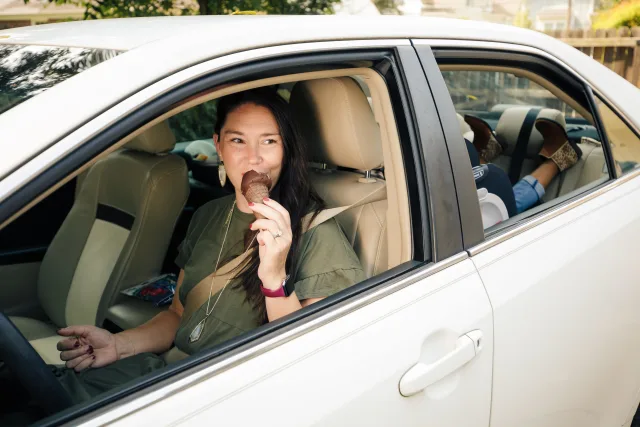Pregnancy comes with a lot of unexpected challenges sleeping, eating, working, cleaning, and even getting dressed is a struggle. But, one of the biggest hurdles? Car rides. From motion sickness and exhaustion to discomfort and frequent bathroom breaks, riding and driving in a vehicle while pregnant is tough.
Still, for most pregnant women, car rides are unavoidable.
Daily commutes might be manageable, but what about long road trips or extended travel? Is it possible to stay safe and comfortable on the road? Fortunately, the answer is yes and we’ve got practical tips to help you prepare!
Here’s what you need to know about taking long car trips during pregnancy:
Can You Go On Long Car Rides While Pregnant?
Yes, you can take long car rides while pregnant! As long as you're healthy and take the proper precautions, there's usually no cause for concern. However, as your pregnancy progresses, it's a good idea to talk to your doctor before any extended travel to make sure there are no issues.
How Long Can A Pregnant Woman Ride In A Car?
There’s no specific point in pregnancy when you must stop driving or riding in a car. Pregnancy itself doesn’t directly make you unsafe behind the wheel, but some studies suggest that common symptoms like fatigue, nausea, or distraction can increase the risk of accidents while driving. For a deeper look, read this post about when to stop driving when pregnant.
As for riding in a car? Unless your doctor advises otherwise, you’re good to go! But, here are some essential safety tips for comfort and peace of mind:
Car Travel Safety Tips For Pregnant Women
Ensure your car is stocked with emergency supplies.
When planning any trip, it's important to stock your car with essentials and emergency supplies. Whether you get a flat tire, run into bad weather, or spill your coffee, you’ll want to be prepared to handle the situation and get back on the road quickly. Here’s our complete list of must-have items to keep in your car.
Don’t use pregnancy seat belt adjusters.
There are cleverly marketed products out there that claim to readjust a seat belt to protect your unborn baby in a crash. These items are not crash-tested and can actually increase your risk of injury. Seat belts alone are generally safe with some re-positioning (more on that in a minute). Here’s more on pregnancy seat belt adjuster.
Position your seat belt properly.
To wear your seat belt safely while pregnant, make a few minor adjustments. Place the lap belt over your thighs and under your belly. Make sure it’s snug! For the shoulder belt, ensure the upper strap is on your shoulder and rests between your breasts. It shouldn’t be across your neck or arm and never put it behind your back!
Do what you can to increase comfort.
One of the main pregnancy symptoms? Discomfort. Things like swelling, weight changes, and hormonal fluctuations make sitting for a prolonged period in a car very uncomfortable. To help, we recommend you wear comfortable shoes and clothes, use a seat cushion for extra support, and keep the air flowing to stay cool and fight nausea.
Take breaks every two hours.
It's important to take a break every two hours during long car rides while pregnant. Use this time to stretch your legs, walk around, and use the restroom. Regular movement helps improve circulation, reduces swelling, and can ease common discomforts like backaches and stiff joints.
Most importantly, it lowers the risk of developing blood clots, such as deep vein thrombosis (DVT), which can be a concern during extended periods of sitting. Even a few minutes of walking or gentle stretching can make a big difference in how you feel during and after the trip.
Plan for motion sickness and nausea.
We already know that pregnancy can make us more sensitive to everything, but you may not know that includes motion! Even if you were never car sick before, pregnancy can have your stomach turning. To help relieve nausea, consider sitting in the front seat, wearing acupuncture bands, sucking on peppermints, and keeping the car cool and comfortable. And, just in case, pack some vomit bags.
Stay hydrated and watch your blood sugar levels.
Staying hydrated and keeping your blood sugar steady are key during long car rides while pregnant. Dehydration and low blood sugar can lead to dizziness, nausea, fatigue, and even contractions. To stay comfortable and safe, it’s a good idea to sip water regularly and bring light snacks to avoid sudden drops in blood sugar that could worsen symptoms.
Don’t drive if you don’t have to.
Can pregnant women drive? Yes. However, if another adult is available, it's often better to let them take the wheel. Pregnancy symptoms like fatigue, nausea, and distractions can make driving more challenging. Plus, as your belly grows, the steering wheel can become uncomfortable or even pose a safety risk in the event of a sudden stop or crash.
Keep a safe distance from the steering wheel.
While we’re on the topic, if you're driving, make sure your breastbone is at least 10 inches away from the steering wheel. This helps minimize the risk of injury if the airbag deploys. If you can't maintain this distance and still comfortably reach the pedals, consider having someone else drive.
Listen to your body; don’t ride if you’re not feeling up to it.
When it comes to long car rides during pregnancy, listen to your body. If you're feeling tired, nauseous, or uncomfortable, it's okay to skip the trip, take a break, or find another time to travel. Pushing yourself too hard can make symptoms worse, so prioritize rest, hydration, and comfort. If the journey feels overwhelming, it’s best to postpone or find a more manageable travel option. Your health should always come first.
Plan your route mindfully.
Of course, you have a set destination for your long drive, but the route is flexible! Make sure you select a route that has plenty of places to stop for bathroom trips or quick breaks. Also note where medical facilities are along the way in case of emergency or other concern requiring medical attention.
Check with your doctor about long trips after 36 weeks.
It's important to talk with your doctor about travel plans before taking long trips after 36 weeks of pregnancy. At this stage, your baby is close to arriving, and travel may increase the risk of complications like premature labor. Your doctor can provide personalized advice based on your health and pregnancy progress.

Travel during pregnancy safely and comfortably with these tips!
When you're pregnant . . . everything requires a little extra thought. If you’re planning a long drive during your pregnancy, take the proper steps to keep the ride safe and comfortable. This will help give you the peace of mind you need to make the trip manageable . . and maybe even enjoyable! So, book that babymoon, RSVP to that wedding, or say yes to that work trip you deserve it!
As an Amazon Associate, Safe in the Seat earns from qualifying purchases.






